Intersection of Social Media and Intellectual Property Law
- Last Updated: June 12th, 2025

Attorney Jessie Paluch, founder of TruLaw, has over 25 years of experience as a personal injury and mass tort attorney, and previously worked as an international tax attorney at Deloitte. Jessie collaborates with attorneys nationwide — enabling her to share reliable, up-to-date legal information with our readers.
Legally Reviewed
This article has been written and reviewed for legal accuracy and clarity by the team of writers and legal experts at TruLawsuit Info and is as accurate as possible. This content should not be taken as legal advice from an attorney. If you would like to learn more about our owner and experienced injury lawyer, Jessie Paluch, you can do so here.
Fact-Checked
TruLawsuit Info does everything possible to make sure the information in this article is up to date and accurate. If you need specific legal advice about your case, contact our team by using the chat on the bottom of this page. This article should not be taken as advice from an attorney.
Key Takeaways:
- Safeguarding intellectual property is crucial in the digital age to prevent consumer confusion, protect business identities, and avoid costly legal disputes, especially with the rapid growth of social media.
- Copyright infringement and unauthorized use of content on social media can lead to revenue loss for IP owners, damage to reputations, and potential legal action, requiring vigilant monitoring and enforcement.
- As social media evolves, intellectual property laws must adapt to address emerging trends like AI-generated content, platform accountability, and global harmonization to balance innovation and IP rights protection.
Overview of Social Media and Intellectual Property Law
On this page, we’ll discuss the intersection of social media and intellectual property law, importance of intellectual property protection in the digital age, how social media platforms handle intellectual property issues, and much more.
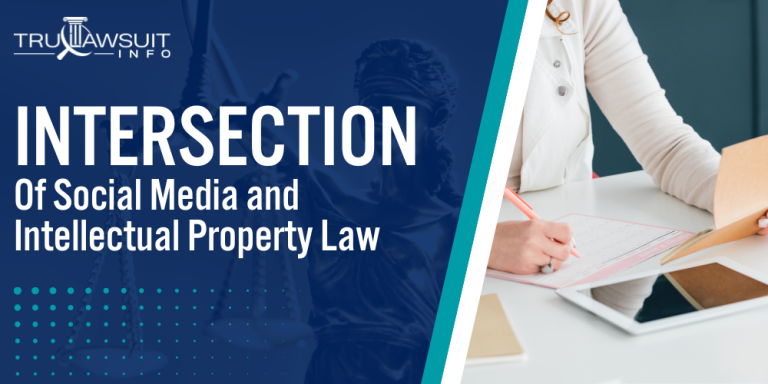
Intro to Social Media and Intellectual Property Law
Some of the key aspects of social media and intellectual property law include, but are not limited to:
- Copyright Infringement: Social media platforms often struggle with users posting copyrighted content without permission, such as images, videos, or music.
- Trademark Violations: Brands may face issues with imposters creating fake accounts or using their trademarks in unauthorized ways on social media.
- Digital Millennium Copyright Act (DMCA): This law provides a framework for social media platforms to handle copyright infringement claims and establishes a “safe harbor” from liability if they follow certain procedures.
- Platform Policies: Social media companies typically have their own policies and procedures for handling intellectual property complaints, which may vary from platform to platform.
If you are a content creator or brand owner who has had your intellectual property rights violated on social media, consulting with specialized attorneys can help you understand your legal options.
Contact TruLawsuit Info using the chat on this page for an instant case evaluation to find out if you qualify for legal action.
Table of Contents
Importance Of Intellectual Property Protection In The Digital Age
In the digital age, safeguarding intellectual property (IP) is imperative to prevent consumer confusion, protect business names, and avoid costly legal action.
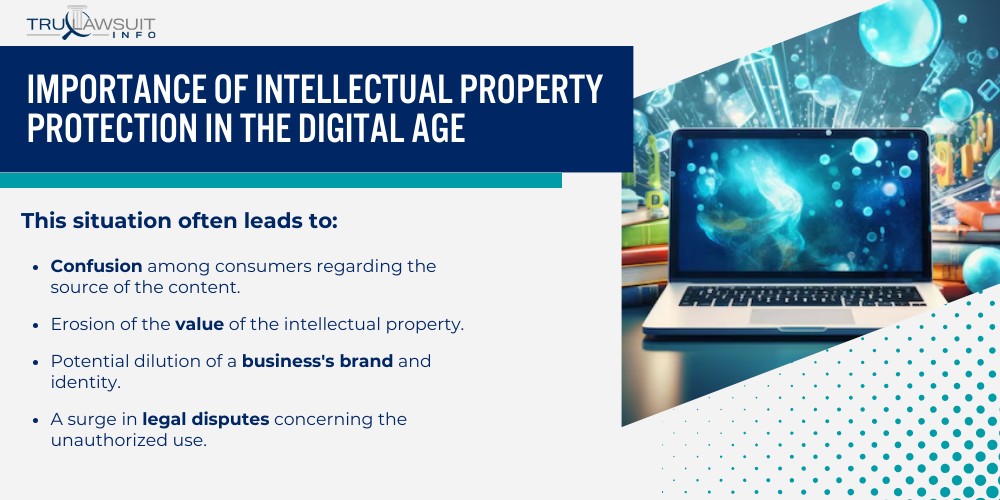
Copyright Infringement On Social Media
Social media’s exponential growth has amplified the risks of copyright infringement.
Users frequently upload and share content without authorization, creating a minefield for IP owners.
This situation often leads to:
- Confusion among consumers regarding the source of the content.
- Erosion of the value of the intellectual property.
- Potential dilution of a business’s brand and identity.
- A surge in legal disputes concerning the unauthorized use.
Unauthorized sharing of copyrighted content can damage the reputation of individuals and entities, leading them to take legal action to defend their rights.
Unauthorized Use And Sharing Of Copyrighted Content
Digital platforms have made unauthorized use and sharing of copyrighted content more prevalent.
Key points include:
- Unauthorized use can lead to loss of revenue for IP owners.
- It can also cause a breakdown in licensing agreements between creators and distributors.
- There is a need for efficient mechanisms to identify and remove infringing content.
- Educating users about copyright laws is critical to curtail the spread of unauthorized content.
In conclusion, companies and creators utilize legal measures and digital tools to monitor and protect their intellectual property on social media and other digital platforms.
Trademark Issues In Social Media
In the fast-paced world of social media, trademark issues are increasingly common as businesses strive to protect their brands and trademarks.
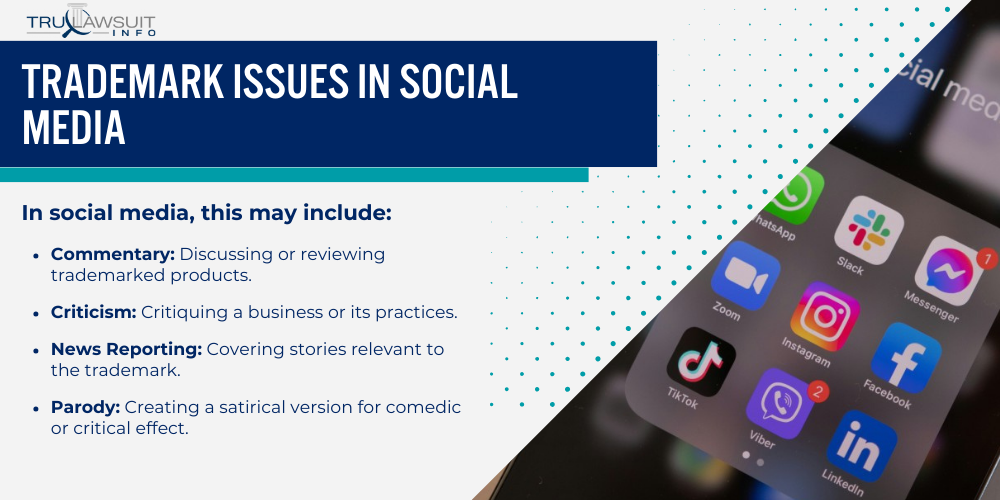
Misuse can lead to consumer confusion and damage to a company’s reputation.
Fair Use Doctrine And Its Application To Social Media
The Fair Use Doctrine allows limited use of trademarks without permission under certain conditions.
In social media, this may include:
- Commentary: Discussing or reviewing trademarked products.
- Criticism: Critiquing a business or its practices.
- News Reporting: Covering stories relevant to the trademark.
- Parody: Creating a satirical version for comedic or critical effect.
Each case hinges on balancing trademark ownership and the public’s right to free expression.
The fair use defense may be raised against infringement claims, provided that claimed parodies (artistic and editorial) were not used for commercial purposes.
Brand Protection And Enforcement On Social Media Platforms
Brands must be vigilant on social media to maintain protection.
Enforcement actions might include:
- Monitoring: Regular searches for unauthorized use.
- Registration: Filing trademarks with social media handles.
- Policy Enforcement: Utilizing platform policies for takedown requests.
- Legal Action: When necessary, pursue infringement claims.
Social media platforms like Facebook often provide tools for businesses to report copyright infringement and manage intellectual property violations.
Dealing With Impersonation And Fraudulent Accounts
Impersonation and fraudulent accounts can seriously harm a brand‘s integrity.
Companies should:
- Verify Accounts: Ensuring the platform verifies official accounts.
- Educate Consumers: To recognize official channels and avoid scams.
- Report Violations: Taking advantage of platform reporting mechanisms.
- Act Promptly: Quickly addressing infringements to minimize damage.
Businesses must regularly engage with their social media presence to protect against unauthorized uses of their trademarks.
Patent Law And Social Media Innovations
The intersection of patent law and social media is a dynamic area where intellectual property law shapes the innovation of digital platforms.
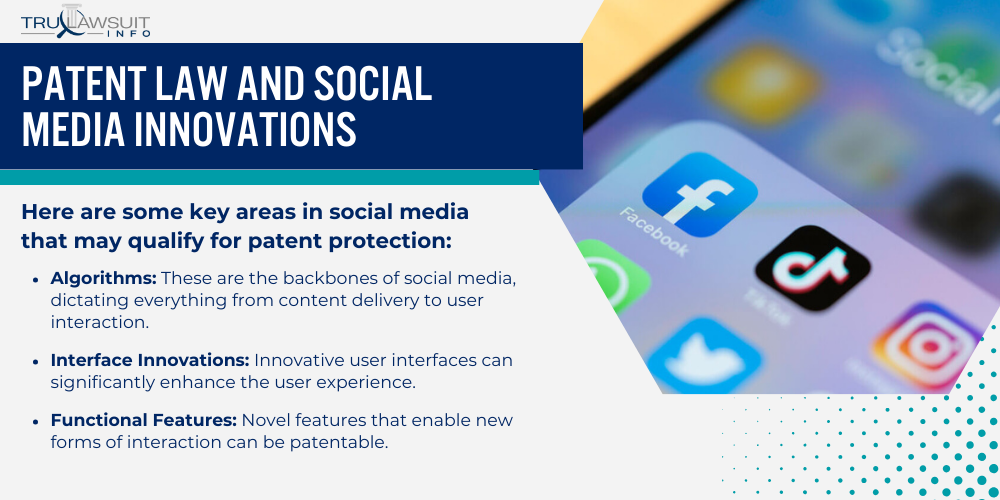
The patentability of new technologies and the potential for infringement claims are pivotal for companies operating in this space.
Patentability Of Social Media Algorithms And Features
With rapid growth in social media platforms, developers are vitally concerned about the patentability of unique algorithms and features.
Here are some key areas in social media that may qualify for patent protection:
- Algorithms: These are the backbones of social media, dictating everything from content delivery to user interaction.
- Interface Innovations: Innovative user interfaces can significantly enhance the user experience.
- Functional Features: Novel features that enable new forms of interaction can be patentable.
- Technical Solutions: Improvements that solve specific technical issues in the social media context can be protected under patent law.
To be patentable, these innovations must meet certain legal criteria, including novelty, non-obviousness, and utility.
For instance, a new approach to filtering content to individual users may be considered if it demonstrates a technical advancement over existing methods.
Patent Infringement Claims In The Social Media Landscape
As social media platforms implement new features, they must be wary of patent infringement claims.
Here are some critical considerations when dealing with patent infringement claims in the social media realm:
- Due Diligence: Developers must conduct thorough searches to ensure they don’t infringe on existing patents.
- Litigation: Infringement claims can lead to litigation, with potential consequences including injunctions and monetary damages.
- Licensing Agreements: Entities may enter into agreements to use patented technology legally.
- Defensive Strategies: Some companies acquire patents defensively to counteract infringement claims.
If an infringement is alleged, the defendant must navigate the legal system to either disprove the claim or reach a settlement.
Understanding one’s own legal rights and the legal rights of others is essential in developing and introducing new social media technologies.
Trade Secrets And Confidential Information On Social Media
The line between sharing and oversharing is perilously thin in a world where social media posts can go viral in minutes.
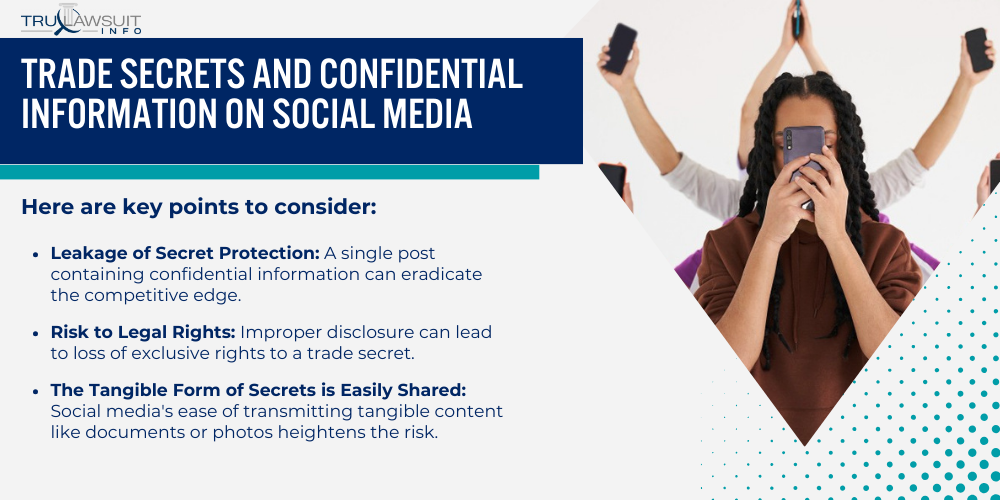
This poses a significant risk to businesses’ trade secrets and intellectual property protection.
Risks Of Disclosing Sensitive Information On Social Media
Trade secrets can be compromised with just a few clicks.
Employees and partners may inadvertently or intentionally disclose sensitive information on social media platforms.
Here are key points to consider:
- Leakage of Secret Protection: A single post containing confidential information can eradicate the competitive edge.
- Risk to Legal Rights: Improper disclosure can lead to loss of exclusive rights to a trade secret.
- The Tangible Form of Secrets is Easily Shared: Social media’s ease of transmitting tangible content like documents or photos heightens the risk.
- Damage to Business Reputation: Any perceived negligence in safeguarding secrets affects business trustworthiness.
Strategies For Safeguarding Trade Secrets In The Digital Realm
Creating original content and engaging on social media while protecting intellectual property requires strategic planning.
A business must ensure complete control over the dispersal of confidential information.
Here are some effective strategies:
- Develop Clear Policies: Establish strict guidelines for what employees can share online.
- Training on the Importance of Discretion: Regularly educate teams about the risks of information leaks.
- Use of Non-Disclosure Agreements (NDAs): Legal contracts can reinforce the significance of secret protection.
- Monitoring and Enforcement: Watching social channels for unauthorized disclosure ensures quick action to protect legal rights.
- Limiting Access to Sensitive Information: Only employees who need to know should have access to trade secrets.
Influencer Marketing And Intellectual Property Rights
Influencer marketing intersects with intellectual property law when influencers create and share content online, raising important questions about ownership and compliance with regulatory guidelines.
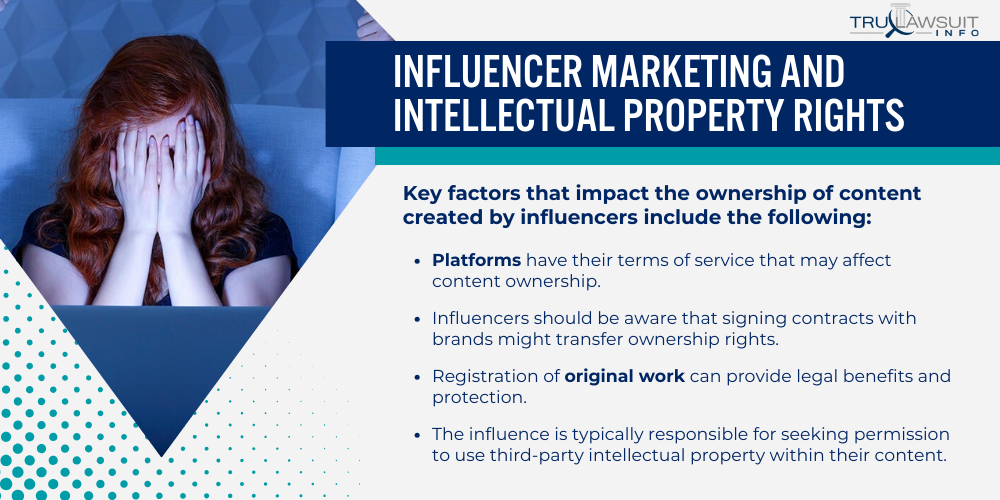
Ownership Of Content Created By Influencers
Original works by influencers can encompass various creative works, such as videos, images, and written posts.
Influencers need to understand their intellectual property rights regarding the content they create.
Key factors that impact the ownership of content created by influencers include the following:
- Platforms have their terms of service that may affect content ownership.
- Influencers should be aware that signing contracts with brands might transfer ownership rights.
- Registration of original work can provide legal benefits and protection.
- The influence’s typically responsible for seeking permission to use third-party intellectual property within their content.
Disclosure Requirements And Endorsement Guidelines
The intersection of intellectual property with consumer protection laws is encapsulated in the guidelines for advertisement disclosures.
Influencers are often mandated to disclose their relationships with brands clearly and conspicuously.
Several key requirements govern the disclosure of endorsements and brand relationships for influencers:
- Disclosure of material relationships with brands is required when endorsing products.
- There are specific methods of disclosure prescribed by Endorsements, Influencers, and Reviews | Federal Trade Commission to maintain transparency.
- Not adhering to these guidelines can result in legal consequences for the influencer and the brand.
- Disclosures must be clear and prominently placed so viewers notice and understand them.
User-Generated Content And Intellectual Property
Intellectual property law intertwines with user-generated content in the social media landscape, posing challenges for social media platforms and content creators.
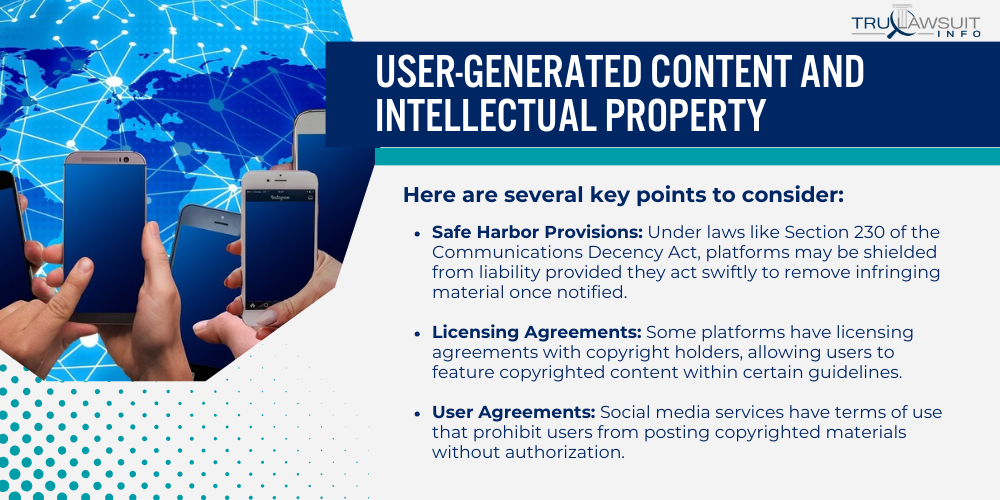
Liability Of Social Media Platforms For User-Generated Infringement
Social media platforms that host user-generated content can potentially face liability for copyright registration and infringement if they do not take appropriate measures to prevent or respond to unauthorized use of copyrighted material.
Here are several key points to consider:
- Safe Harbor Provisions: Under laws like Section 230 of the Communications Decency Act, platforms may be shielded from liability provided they act swiftly to remove infringing material once notified.
- Licensing Agreements: Some platforms have licensing agreements with copyright holders, allowing users to feature copyrighted content within certain guidelines.
- User Agreements: Social media services have terms of use that prohibit users from posting copyrighted materials without authorization.
- Court Decisions: The legal landscape continually evolves, as seen in Supreme Court cases that further interpret these liabilities.
Implementing Effective Notice-And-Takedown Procedures
Effective notice-and-takedown procedures are essential for social media platforms to manage infringing user-generated content.
These are the key factors for ensuring effective notice-and-takedown procedures:
- Timeliness: A prompt response to infringement notices is critical for compliance with legal standards.
- Accessibility: Takedown procedures must be user-friendly to encourage reporting and compliance.
- Transparency: Clear communication with users about the status of claims and specific actions taken is important.
- Balance: Platforms must balance removing infringing content with protecting users’ rights to fair use and free expression.
International Intellectual Property Laws And Social Media
Social media platforms operate on a global scale, presenting unique challenges for the enforcement of intellectual property (IP) laws.
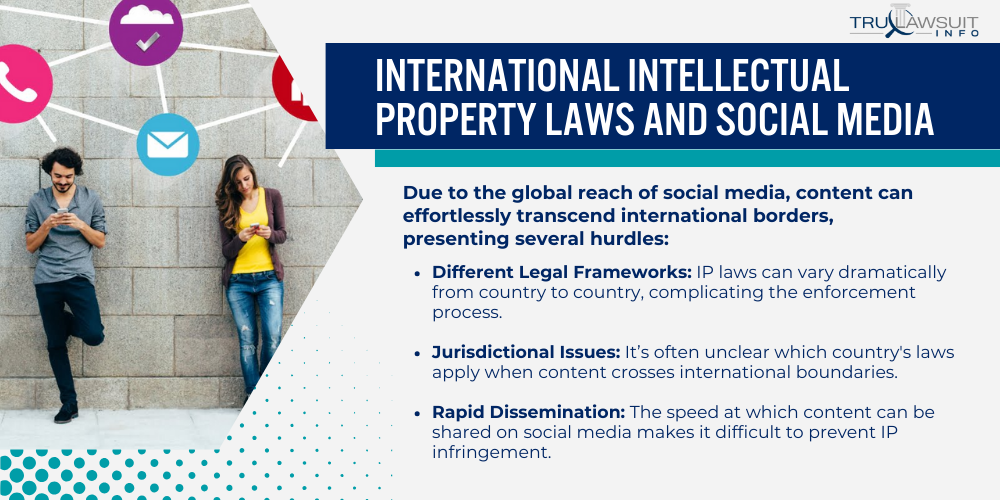
These platforms often house user-generated content that can easily cross borders, making it difficult to navigate the intricacies of international IP law.
Challenges Of Enforcing IP Rights Across Borders
Social media has revolutionized how content is shared and disseminated, leading to significant challenges in enforcing IP rights.
Due to the global reach of social media, content can effortlessly transcend international borders, presenting several hurdles:
- Different Legal Frameworks: IP laws can vary dramatically from country to country, complicating the enforcement process.
- Jurisdictional Issues: It’s often unclear which country’s laws apply when content crosses international boundaries.
- Rapid Dissemination: The speed at which content can be shared on social media makes it difficult to prevent IP infringement.
- Anonymous Infringement: Identifying and taking legal action against anonymous infringers can be an arduous task.
Enforcing IP rights requires a nuanced understanding of the legal landscape and how it applies to the digital environment of social media services.
Harmonization Efforts And International Cooperation
Efforts to synchronize IP regulation and foster international cooperation are essential for effective protection.
Significant initiatives include:
- The Agreement on Trade-Related Aspects of Intellectual Property Rights (TRIPS) integrates basic principles of international trade with IP law among World Trade Organization member states.
- Bilateral and Multilateral Treaties: Countries often enter into agreements to respect and enforce each other’s IP laws.
- Global Organizations: Entities like the World Intellectual Property Organization (WIPO) work to develop a balanced and accessible international IP system.
- Online Service Providers’ Policies: Social media platforms have developed policies and tools to combat IP infringement.
These collaborative efforts aim to create a cohesive framework for protecting IP rights in social media’s ever-changing landscape.
Emerging Trends And Future Developments
Social media continues to evolve rapidly, involving various intellectual property issues.
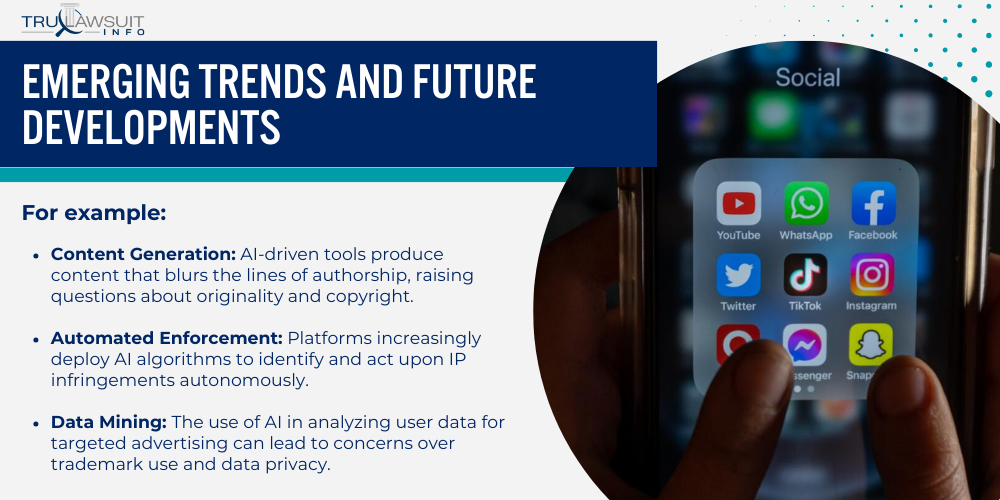
As technology evolves, so does the interplay between social media platforms and intellectual property (IP) law.
Artificial Intelligence And Its Impact On IP In Social Media
Artificial intelligence (AI) is reshaping how content is created and shared on social media platforms.
The integration of AI into these platforms presents novel considerations for IP protection.
For example:
- Content Generation: AI-driven tools produce content that blurs the lines of authorship, raising questions about originality and copyright.
- Automated Enforcement: Platforms increasingly deploy AI algorithms to identify and act upon IP infringements autonomously.
- Data Mining: The use of AI in analyzing user data for targeted advertising can lead to concerns over trademark use and data privacy.
- Creative Works: AI is now capable of creating content, music, art, and writing that challenge existing IP categorizations.
AI’s growing capabilities necessitate a reassessment of traditional IP frameworks to ensure their relevance in the digital age.
Adapting Intellectual Property Laws To Keep Pace With Technology
To prevent IP law from becoming obsolete, continuous adaptations are necessary.
Technological advancements in social media have led to the following key areas of development:
- Platform Accountability: Social media companies’ roles in IP protection are becoming more pronounced, and they are expected to combat IP infringement proactively.
- Global Harmonization: As social media operates internationally, there is a push towards standardizing IP laws across borders for more efficient enforcement.
- User Awareness Programs: Increasing user knowledge about IP rights is crucial in an age where content creation and sharing are ubiquitous.
- Legislative Updates: Laws are being reviewed and updated to address the novel ways in which IP is being used and challenged online.
As technology continues to progress, these adjustments in IP law aim to maintain a balance between innovation and the rights of IP owners.
Trulawsuit Info: #1 Social Media Online Harassment Attorney
When social media becomes a battleground, legal action is often necessary to protect legal rights.
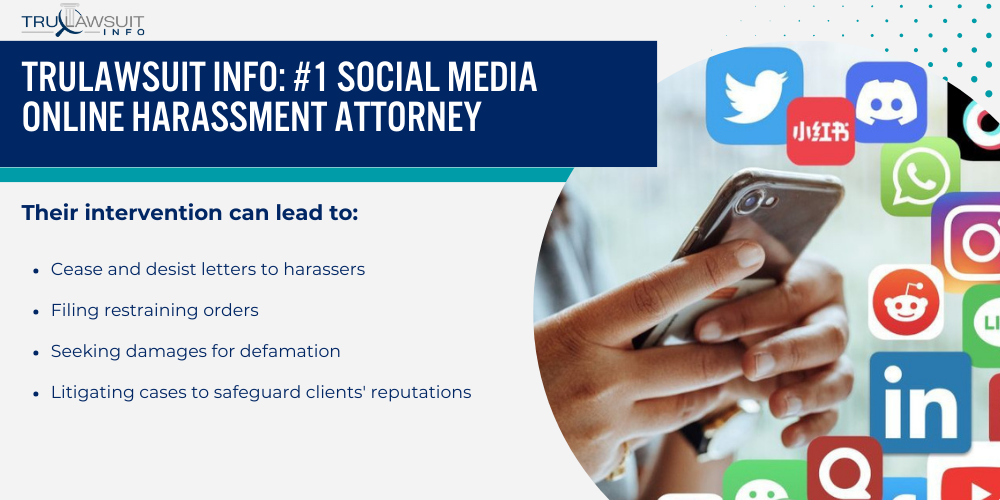
Businesses and consumers alike can be subject to, or guilty of, online harassment.
A top social media harassment attorney holds a key role in such scenarios, providing clients with guidance and representation.
An attorney specializing in social media harassment is well-versed in laws that protect individuals and businesses from online abuse.
Their intervention can lead to:
- Cease and desist letters to harassers
- Filing restraining orders
- Seeking damages for defamation
- Litigating cases to safeguard clients’ reputations
Businesses and Consumers: Both parties are increasingly aware of the impact that online harassment can have on their operations and personal lives.
They must understand:
- The importance of documentation of all instances of harassment
- Reporting abusive behavior to the appropriate social media platforms
- The potential need for legal consultation if harassment continues
- Protective measures, such as privacy settings, to prevent future harassment
Individuals and organizations must know that they have the right to seek justice against online harassment.
They should be informed about:
- Data privacy laws relevant to online activities
- Legal definitions of harassment and abuse
- The boundary between free speech and unlawful behavior
- Resources available for legal support and advice
A leading social media online harassment attorney doesn’t just react to issues as they arise; they strategize preemptive measures, ensuring clients are well-prepared for potential online conflicts.
Frequently Asked Questions
-
How has the Internet transformed intellectual property creation, distribution, and protection?
The Internet has revolutionized intellectual property creation, distribution, and protection.
It has simplified the dissemination of creative works, enabling creators to easily share content globally. However, due to the vast scale and accessibility of online platforms, challenges in monitoring and enforcing intellectual property rights have also been introduced.
-
What are the rights of intellectual property holders in digital media?
Intellectual property holders in digital media can control how their works are used, shared, and distributed online.
In infringement cases, they can seek legal remedies, which may include removing unauthorized content or compensation for its use.
-
In what ways does social media impact intellectual property laws?
Social media has impacted intellectual property laws by necessitating adaptations to account for new content sharing and creation types.
The platforms have become arenas for copyright infringement and fair use considerations, prompting legal discussions about their boundaries in a digital age.
-
How can one ensure compliance with copyright law when posting content on social media platforms?
Only post content you have created or have permission to use on social media platforms to ensure compliance with copyright law.
Giving credit to original creators and understanding the platform-specific rules regarding copyrighted material is also advisable.
-
Do individuals retain ownership of their content once it is posted on social media?
Individuals generally retain ownership of their content after posting it on social media.
However, they often grant the platform a license to use, reproduce, and distribute that content according to the terms of service agreed upon by the user.
-
What are notable legal cases involving intellectual property in social media?
A notable legal case involving intellectual property on social media is Elonis v. U.S., which examined the interpretation of threats made over the platform in the context of free speech.
This case highlights the evolving nature of law as it attempts to address new challenges presented by social media.

Experienced Attorney & Legal SaaS CEO
With over 25 years of legal experience, Jessie is an Illinois lawyer, a CPA, and a mother of three. She spent the first decade of her career working as an international tax attorney at Deloitte.
In 2009, Jessie co-founded her own law firm with her husband – which has scaled to over 30 employees since its conception.
In 2016, Jessie founded TruLaw, which allows her to collaborate with attorneys and legal experts across the United States on a daily basis. This hypervaluable network of experts is what enables her to share reliable legal information with her readers!
Have A Case?
Here, at Tru Lawsuit Info, we’re committed to helping victims get the justice they deserve.
To do this, we actively work to connect them with attorneys who are experts in litigating cases similar to theirs.
Would you like our help?
Tru Lawsuit Info is a reliable source of information about issues that may affect your health and safety, such as faulty products, data breaches, and environmental hazards.
Our team of experienced writers collaborates with medical professionals, lawyers, and advocates to produce informative articles, guides, and other resources that raise awareness of these topics.
Our thorough research provides consumers with access to reliable information and updates on lawsuits happening around the country. We also can connect consumers with attorneys if they need assistance.
Camp Lejeune's water contamination issue spanned several decades starting in the 1950s. Exposure to these chemicals has been linked to various serious health issues, including cancer, organ diseases, and death.
Research is increasingly suggesting a link between the use of Tylenol during pregnancy and the development of neurodevelopmental disorders, such as autism and ADHD, in infants.
Legal action is being taken against manufacturers of Aqueous Film-Forming Foam (AFFF), a chemical used in fighting fires. The plaintiffs allege that exposure to the foam caused health issues such as cancer, organ damage, and birth and fertility issues.
Have A Case?
Here, at Tru Lawsuit Info, we’re committed to helping victims get the justice they deserve.
To do this, we actively work to connect them with attorneys who are experts in litigating cases similar to theirs.
Would you like our help?







